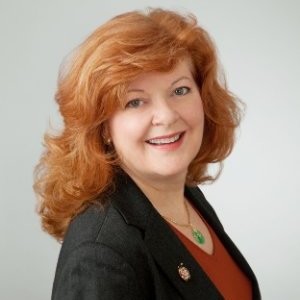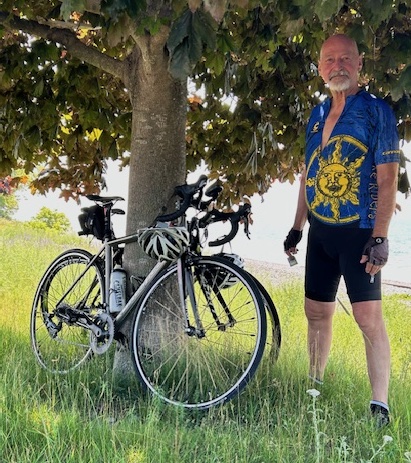Guest Author: Catherine Mossop

A Glimmer with Brian
Brian had always prided himself on being well-groomed and dressed smartly as befitting a professional. He trimmed his beard and shaved his pate weekly.
But now he needs help.
He takes the warm washcloth from my hand and carefully wipes the mirror I am holding for him. He examines the mirror closely. Where he sees his beard, he gently wipes the glass in the same direction as he would have shaved; where he sees his head, he carefully strokes, making sure not to get the washcloth in his eyes. He looks intensely through the water on the mirror, and I wonder what he’s thinking, what he might be seeing? Does he feel the hard surface of the mirror and think it is his head? I know not to correct him. I will never know what his experience is, and he certainly doesn’t describe it.
He hands me the washcloth announcing, “there!”. When I attempt to place the cloth on his cheek, he pulls it away and repeats, “there!”, with a note of agitation. I need a new tactic. While my thinking self wants him to look good, my emotional self wants him to feel good, to feel like the executive he was just two years ago.
Brian is only 71 years old. He first began to show signs of Early Onset Dementia (Alzheimer’s?) – beyond the normal memory challenges we all experience as we age – six years ago. But his decline accelerated in the last year, and he is now confined to hospital since February, waiting for a long-term care facility.
“I brought your best razor,” I said. “You will look handsome and feel fabulous”. I am borrowing from the “Look Good, Feel Better” meme for people living with Cancer.
“No!” he exclaims. But I know not all ‘no’s’ mean no. Simply, it is easier to say no than yes. Dementia likes the word ‘no’. Try it: say the word ’yes’. Do it slowly; consciously feel your cheek, tongue, and throat muscles. Now do the same with ‘no’ – it’s easier to say no than yes. Dementia brains prefer ‘no’. Using logical reasoning won’t work – Dementia doesn’t care. I need an approach that focuses on feeling great.
I place my hand on his shoulder, I can feel the tension stored there. With the gentle rhythmic movement of the heel of my hand, the muscles begin to relax.
“Ahhh, a massage first perhaps?” I ask him. “It feels sooooo goooood, just like after a bike ride – did you do a big bike ride today?” “Donno,” he says with a shrug.
Our last bike ride was only eight months ago and today he doesn’t know who I am; the rapid progression is devastating. I put faith in triggering the emotional memory in him of my hands working a deep, relaxing massage. I want to induce gentle contentment and a feeling of the loving care I have for him. Dementia isn’t logical – that part of his mind is gone – it is emotional. The only thing that matters is the feeling of care, calm, and presence – minimizing frustration.
I’ve lost my husband, my lover, my companion, the joy of doing together – especially cycling: the Ride to Conquer Cancer, the Ride for United Way, the rides for fun! Riding on vacation, riding with clubs and friends, climbing the big hills and flying down the other side.

Brian did all the things you are supposed to do to prevent Dementia – played music, spoke several languages, read voraciously, spent time in gardens, ate well, drank the good wine first – but Dementia doesn’t care. It may take you young, it may take you old; it can take you whenever it wants and create a pile-up of relationship destruction – just like suddenly hitting gravel when you are on a road bike – painful road-rash with bits of dirt that will not come out. Dementia doesn’t care.
Early Onset Dementia refuses to be gentle – it is an unstoppable force that smacks into a fragile brain. It is a test of our humanity; we can’t control it, we can’t do anything about it; it is a brutal experience for friends and family. It is an unravelling of a life lived to only the most basic and oldest memories, there are no more adventures, no more projects and no more conversations. There is nothing sharp or clear-eyed, and no mental clarity, but there is still a moment of pure delight when he sees a familiar face walk into the room, a delectable chocolate truffle enjoyed in the moment.
Now it’s time to shave his neck and head. I wrap both in a warm towel then slather both with shave cream. Oops! more than required and I am chastised in full-on gibberish. But I got the message. All part of the plan. I place his razor in his hand and ask him to show me how to do it. Miraculously old muscle memory kicks in and he handles the shave with skill. I relax and hold the mirror he had washed so carefully. The whole exercise has taken two hours, but he is beaming and handsome.
My role as life partner has shifted now – I need an 11th gear on my bicycle to help me navigate an unfamiliar road filled with unpredictable twists and turns. I need to shift that gear and find the turning points and signposts that add depth and texture instead of sadness and despair. While his vibrant energy has gone, and he doesn’t know my name today, there are still moments of loving connectedness. At times I have to smile – in a fleeting moment of clarity on my last visit, he said, “oh you’re nice, will you marry me?”.
All I can wish for is that his memory feels the sun warm his soul as it shines a pathway through a darkness filled with potholes, cliffs, and gravel; and the wind is to his back so he can ride his bicycle on a journey that isn’t so frightening. Because Dementia[1] doesn’t care.
Catherine Mossop, reporting to you from Cobourg, Ontario
© Douglas Jordan & Catherine Mossop, AFS Publishing
All rights reserved. No part of these blogs and newsletters may be reproduced without the express permission of the author and/or the publisher, except upon payment of a small royalty, 5¢.
[1] Editor’s note: Brian’s form of dementia is almost certainly Alzheimer’s Disease; there’s no certain diagnosis except by postmortem biopsy. There is no cure for Alzheimer’s Disease but there are treatments that may help the afflicted extend their productive lives. As for many devastating diseases, it isn’t just the patient who suffers; family members and care-givers carry a heavy burden. Catherine has found the Alzheimer’s Society of Canada to be very helpful. For more information, please check out their website. Doug Jordan
